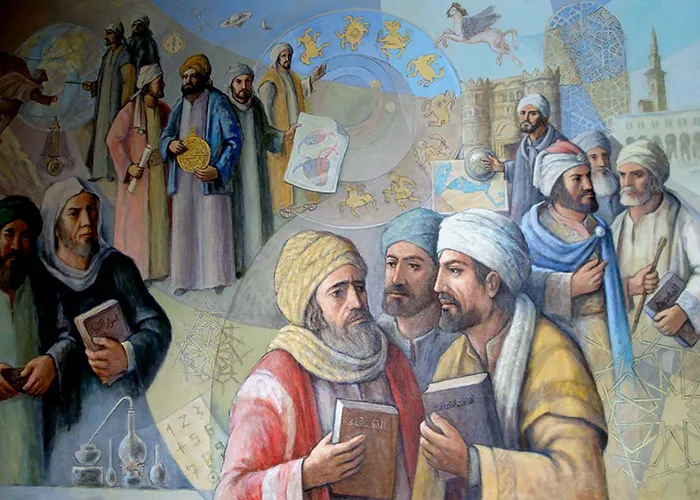Editorial – volume02 Issue29
Honouring the Legacy of Knowledge: Lessons from the Lives of Our Scholars
Introduction:
As we navigate through the challenges and opportunities of our time, it becomes increasingly important for Muslim leaders including Imams, teachers, and community organisers to draw inspiration from the enduring wisdom of our scholarly tradition. This week, our attention turns to the lives and legacies of three towering figures in Islamic intellectual history: ʿAllāmah Ḥillī, Shaykh al-Ṭūsī, and Mullā Muḥammad Narāqī. Their respective anniversaries of passing on the 21st, 22nd, and 23rd of Muḥarram offer an opportunity not only to honour their contributions but also to reflect on the deeper Islamic values they upheld.
The purpose of this reflection is not merely historical, but deeply practical. As Muslims living in diverse and often secular societies, our ability to live ethically, make principled decisions, and teach others with clarity depends in no small part on our connection to the knowledge and ethical frameworks provided by Islam. The scholars we remember this week embodied the Qur’anic vision of knowledge: rooted in reverence for Allah, committed to service, and oriented toward moral transformation.
21st of Muḥarram – The Passing of ʿAllāmah Ḥillī (726 AH)
ʿAllāmah Ḥillī was one of the most prominent Shia scholars of the post-Ghadeer era, distinguished for his encyclopaedic knowledge in theology, jurisprudence, and philosophy. Born in Hillah, Iraq, he authored more than 100 books, several of which became standard texts in Islamic seminaries. His ability to articulate Shia theology in dialogue with broader Islamic thought made him a pivotal figure in the development of rational theology (kalām) and jurisprudential methodology.
Islam places tremendous value on the pursuit and transmission of beneficial knowledge. As the Qur’an states:
يَرْفَعِ ٱللَّهُ ٱلَّذِينَ آمَنُوا۟ مِنكُمْ وَٱلَّذِينَ أُوتُوا۟ ٱلْعِلْمَ دَرَجَـٰتٍ
“Allah will raise those who have believed among you and those who were given knowledge, by degrees.” (Qur’an 58:11)
ʿAllāmah Ḥillī exemplified this elevation not merely in scholarly status but in his moral and spiritual grounding.
Message for Today:
Muslims in the West can take from ʿAllāmah Ḥillī the importance of integrating religious knowledge with rational thinking and engagement with wider intellectual traditions.
Practical Challenge:
Organise or attend a study circle this week where classical Islamic texts are discussed alongside their relevance to contemporary issues in the West.
22nd of Muḥarram – The Passing of Shaykh al-Ṭūsī (460 AH)
Shaykh al-Ṭūsī, often called “Shaykh al-Ṭāʾifah”, was the founder of the Ḥawza of Najaf and one of the most authoritative voices in Shia jurisprudence. His magnum opus Al-Istibsār and Tahdhīb al-Aḥkām remain two of the Four Books of Shia Hadith. He also made monumental contributions to Qur’anic exegesis and rational theology, and his works reflect a harmonisation of textual fidelity with legal reasoning.
One of the outstanding works authored by Shaykh al-Ṭūsī is Al-Tibyān fī Tafsīr al-Qurʾān. This book is the first complete Shia commentary on the Holy Qur’an, in which the exegete, in addition to quoting transmitted narrations (riwāyāt maʾthūrah), evaluates the interpretations of earlier and contemporary scholars by drawing upon reason and various branches of knowledge. Al-Tibyān fī Tafsīr al-Qurʾān is a commentary on the entire Qur’an, arranged in the order of its chapters (sūrahs), and compiled into ten volumes. Based on the valuable service he rendered in the sacred domain of the Qur’an, we can rightly consider him a true embodiment of the saying of the Noble Prophet (peace be upon him):
خَيْرُكُمْ مَنْ تَعَلَّمَ الْقُرْآنَ وَعَلَّمَهُ (مستدرك الوسائل، ج ۴، ص ۲۳۵)
“The best of you are those who learn the Qur’an and teach it.”
Message for Today:
Shaykh al-Ṭūsī’s legacy reminds us that the Qur’an is not only to be recited, but also studied, understood, and engaged with critically and spiritually. His pioneering method combined transmitted knowledge (naql) with rational inquiry (ʿaql), showing that faith and intellect go hand in hand in Islam. In a time when many are either overwhelmed by superficial interpretations or disengaged from the Qur’an entirely, his balanced approach is a model for how contemporary Muslims – especially in the West – can reconnect with the Qur’anic message in a thoughtful and reflective way. It urges us to seek deeper understanding, not just through memorisation, but through contemplation, analysis, and sincere application.
Practical Challenge:
Choose one verse from the Qur’an this week. Study its meaning using both a classical tafsīr (like al-Tibyān or Tafsīr al-Mīzān) and a modern English commentary. Write down three insights you gain and share them in a study circle, family discussion, or online post.
23rd of Muḥarram – The Passing of Mullā Muḥammad Narāqī (1297 AH)
Mullā Muḥammad Narāqī (1215–1297 AH), the eldest son of Mullā Aḥmad Narāqī, known by the title ʿAbd al-Ṣāḥib and famously referred to as Ḥujjat al-Islām, was one of the renowned scholars, jurists, and teachers of Iran in the 13th century AH. He pursued his scholarly training under the guidance of his father and received ijtiḥād authorisation from him. He was well-versed in both rational (maʿqūl) and transmitted (manqūl) sciences, and he held the leadership of the city of Kāshān and its surrounding areas, as well as the custodianship of the Sulṭānī School in Kāshān.
His life reflects the Qur’anic ideal of transforming knowledge into humility and ethical growth:
إِنَّمَا يَخْشَى اللَّهَ مِنْ عِبَادِهِ الْعُلَمَاءُ۟
“Only those fear Allah, from among His servants, who have knowledge.” (Qur’an 35:28)
Message for Today:
In modern Western life, ethical confusion and moral relativism are widespread. Muslims can take inspiration from Mullā Narāqī’s legacy by deepening their moral clarity through Islamic ethics grounded in knowledge and spirituality.
Practical Challenge:
Choose one character trait (e.g., sincerity, humility, patience) and study its Islamic definition and practice it consciously throughout the week. Share your reflection with a peer or student circle.
editor's pick
news via inbox
Subscribe to the newsletter.




